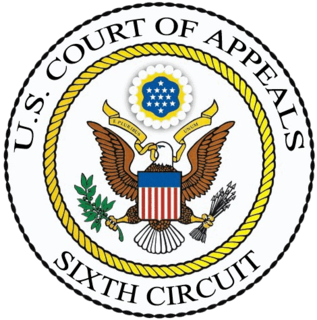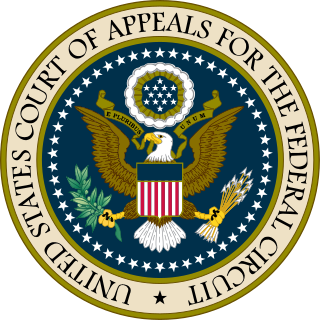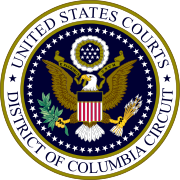
Eviction is the removal of a tenant from rental property by the landlord. In some jurisdictions it may also involve the removal of persons from premises that were foreclosed by a mortgagee.
Copyright misuse is an equitable defense against copyright infringement in the United States allowing copyright infringers to avoid infringement liability if the copyright holder has engaged in abusive or improper conduct in exploiting or enforcing the copyright. Copyright misuse is comparable to, and draws from precedents under, the older doctrine of patent misuse, which dates back to the early years of the 20th century and derives from the more general equity doctrine of "unclean hands", which bars a party from obtaining equitable relief against another when the party has acted improperly.

Daniel v. Waters, 515 F.2d 485 was a 1975 legal case in which the United States Court of Appeals for the Sixth Circuit struck down Tennessee's law regarding the teaching of "equal time" of evolution and creationism in public school science classes because it violated the Establishment clause of the US Constitution.
Hartman v. Moore, 547 U.S. 250 (2006), is a decision by the Supreme Court of the United States involving the pleading standard for retaliatory prosecution claims against government officials. Following a successful lobbying attempt by the CEO of a manufacturing company against competing devices that the United States Postal Service supported, the CEO found himself the target of an investigation by U.S. postal inspectors and a criminal prosecution, which was dismissed for lack of evidence. The CEO then filed suit against the inspectors and other government officials for seeking to prosecute him in retaliation for exercising his First Amendment rights to criticize postal policy. The Court ruled, 5-2, that in order to prove that the prosecution was caused by a retaliatory motive, the plaintiff bringing such a claim must allege and prove that the criminal charges were brought without probable cause.
Landlord harassment is the willing creation, by a landlord or his agents, of conditions that are uncomfortable for one or more tenants in order to induce willing abandonment of a rental contract. Such a strategy is often sought because it avoids costly legal expenses and potential problems with eviction. This kind of activity is common in regions where rent control laws exist, but which do not allow the direct extension of rent-controlled prices from one tenancy to the subsequent tenancy, thus allowing landlords to set higher prices. Landlord harassment carries specific legal penalties in some jurisdictions, but enforcement can be very difficult or even impossible in many circumstances. However, when a crime is committed in the process and motives similar to those described above are subsequently proven in court, then those motives may be considered an aggravating factor in many jurisdictions, thus subjecting the offender(s) to a stiffer sentence.

Webster v. New Lenox School District, 917 F.2d 1004 was a court case in Illinois, in which a social studies teacher Ray Webster sued the New Lenox School District 122 in New Lenox, Illinois, which he accused of violating his First Amendment right to free speech for stopping him from teaching "creation science" in class. The court found however that the school district had a right to restrict Webster to teaching the specified curriculum, and that in any case the teaching of "creation science" was illegal, having been ruled to violate the establishment clause in the U.S. Supreme Court decision in Edwards v. Aguillard, 482 U.S. 578 (1987).
Valentine v. Chrestensen, 316 U.S. 52 (1942), was a case in which the Supreme Court of the United States ruled that commercial speech in public thoroughfares is not constitutionally protected.

United States v. Weitzenhoff, 35 F.3d 1275 is a legal opinion from the Ninth Circuit Court of Appeals that addresses the confusing mens rea requirement of a federal environmental law that imposed criminal sanctions on certain polluters. The main significance of the court's opinion was that it interpreted the word "knowingly" in the statute to mean a general awareness of the wrongfulness of one's actions or the likelihood of illegality, rather than an actual knowledge of the statute being violated. Circuit Court Judge Betty Binns Fletcher authored the majority's legal opinion in this case.
Tax protesters in the United States advance a number of constitutional arguments asserting that the imposition, assessment and collection of the federal income tax violates the United States Constitution. These kinds of arguments, though related to, are distinguished from statutory and administrative arguments, which presuppose the constitutionality of the income tax, as well as from general conspiracy arguments, which are based upon the proposition that the three branches of the federal government are involved together in a deliberate, on-going campaign of deception for the purpose of defrauding individuals or entities of their wealth or profits. Although constitutional challenges to U.S. tax laws are frequently directed towards the validity and effect of the Sixteenth Amendment, assertions that the income tax violates various other provisions of the Constitution have been made as well.
In American landlord–tenant law, a retaliatory eviction is a substantive defense and affirmative cause of action that can be used by a tenant against a landlord. If a tenant reports sanitary violations or violations of minimum housing standards, the landlord cannot evict the tenant in retaliation for reporting the poor housing conditions.

Landlord–tenant law is a part of the common law that details the rights and duties of landlords and tenants. It includes elements of both real property law and contract law.
First National Bank of Montgomery v. Jerome Daly, Dec. 9, 1968, also known as the Credit River Case, was a case tried before a justice of the peace in Minnesota in 1968. The decision in that case is sometimes cited by opponents of the United States banking system.

Javins v. First National Realty Corp., 428 F.2d 1071, was a case decided by the D.C. Circuit that first established the warranty of habitability in landlord–tenant law. The court determined that if the premises become uninhabitable, the tenant is freed from their obligation to pay rent.

Geary v. Visitation of Blessed Virgin Mary School, 7 F.3d 324, was a court case in the United States Court of Appeals for the Third Circuit which considered whether a religious school in Darby, Pennsylvania could be sued for age discrimination.
Tax protesters in the United States advance a number of administrative arguments asserting that the assessment and collection of the federal income tax violates regulations enacted by responsible agencies –primarily the Internal Revenue Service (IRS)– tasked with carrying out the statutes enacted by the United States Congress and signed into law by the President. Such arguments generally include claims that the administrative agency fails to create a duty to pay taxes, or that its operation conflicts with some other law, or that the agency is not authorized by statute to assess or collect income taxes, to seize assets to satisfy tax claims, or to penalize persons who fail to file a return or pay the tax.
Soldal v. Cook County, 506 U.S. 56 (1992), was a United States Supreme Court case in which the Court held that a seizure of property like that which occurs during an eviction, even absent a search or an arrest, implicates the Fourth Amendment. The Court also held that the Amendment protects property as well as privacy interests, in both criminal as well as civil contexts. Finally, saying that "certain wrongs affect more than a single right", the Court left open the possibility that the Fourteenth Amendment's protections against deprivation of property without due process of law may also be implicated.

Atari Games Corp. v. Nintendo of America Inc., 975 F.2d 832, is a United States Court of Appeals for the Federal Circuit case, in which the court held that Atari Games engaged in copyright infringement by copying Nintendo's lock-out system, the 10NES. The 10NES was designed to prevent Nintendo's video game console, the Nintendo Entertainment System (NES), from accepting unauthorized game cartridges. Atari, after unsuccessful attempts to reverse engineer the lock-out system, obtained an unauthorized copy of the source code from the Copyright Office and used it to create its 10NES replica, the Rabbit. The case involved copyright infringement claims by Nintendo and a defense based on fair use and copyright misuse by Atari.
Camara v. Municipal Court, 387 U.S. 523 (1967), is a United States Supreme Court case that overruled a previous case and established the ability of a resident to deny entry to a building inspector without a warrant.










